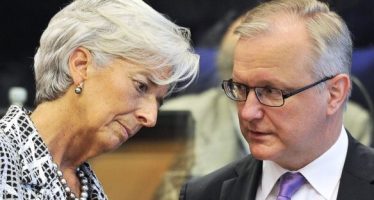Mark Carney: An Admirable Mind-Set at the Bank of England
 Early February, Canadian banker Mark Carney spoke before the House of Commons Treasury Committee about his new job. The hearing was but a formality. Mr Carney’s appointment as the new Governor of the Bank of England had already been announced by the Chancellor of the Exchequer a few months earlier. However, the talk did give the British people their first real glimpse of the man who was about to assume the most powerful non-elected position in the country.
Early February, Canadian banker Mark Carney spoke before the House of Commons Treasury Committee about his new job. The hearing was but a formality. Mr Carney’s appointment as the new Governor of the Bank of England had already been announced by the Chancellor of the Exchequer a few months earlier. However, the talk did give the British people their first real glimpse of the man who was about to assume the most powerful non-elected position in the country.
The first thing they noted was his North American accent, certainly a novelty for a prospective Governor of the BoE. A sigh of relief might have been heard as the odd vowel gave him away as a Canadian. Whatever his accent, Mr Carney’s words charmed those present and assured them equally of his qualifications for the job.
After studying at Harvard, Mark Carney spent thirteen years at Goldman Sachs, posted at its London, New York, Tokyo, and Toronto offices. He worked his way through the senior ranks including co-head of sovereign risk; executive director, emerging debt capital markets; and managing director, investment banking.
After this successful stint at Goldman, he went back to academia, doing a post graduate degree at Oxford and receiving his PhD in economics in 1995. Mr Carney later went on to become Governor at the Bank of Canada, a position he held during the 2007 financial crisis which the Canadian economy weathered remarkably well.
Mr Carney supplemented his day job with chairman positions at a number of international organisations such as the Financial Stability Board (FSB) and the Bank for International Settlements’ Committee on the Global Financial System. Mr Carney is also a foundation board member of the World Economic Forum.
In Canada, Mark Carney gained popularity as a level-headed, straight-talking banker. One who very much understood the board room culture but was not afraid to take positions contrary to that of his peers. During his time as chairman, the FSB implemented measures pushing 30 or more of the world’s biggest banks to hold more capital in reserve. He also lead a campaign to monitor whether and how countries are implementing the new rules, and to “name and shame” governments that were not doing their bit to rein in the riskiest behaviour.
As governor of the Bank of Canada, Mr Carney was one of a select few financial leaders to voice support for the Occupy Movement. In 2011, as most of the world’s bankers reacted in horror at the notion that the Greek government should hold a referendum on whether or not a bailout should be accepted, Mr Carney caused eyebrows to raise when he emphasized the importance of seeking popular support for painful economic restructuring.
On July 1st, Mark Carney started his new job at the Bank of England. He was duly offered a chauffeur driven vehicle, but chose to commute by subway instead. He may even have tried a dry-run of his commute in order not to be late on day one. Expectations were running high: The coverage of his arrival was akin to that of a rock star. Scepticism was in the air as well: His plans for the major issues facing the British economy were yet unknown and he had yet to justify his handsome pay package.
Mark Carney´s forward guidance approach certainly has its share of detractors. As the British economy shows signs of recovery, many call for an increase of interest rates ahead of schedule. However, Mr Carney is sticking to his guns. Uncharacteristically for a central banker, he wants to keep interest rates at their current low level until the unemployment level has dropped to 7% or lower.
This rather novel approach of putting emphasis on reducing unemployment shows Carney to be a banker with a considered, holistic, bottom-up attitude to economic recovery. He clearly values long-term stability and wishes any economic recovery to be both robust and lasting. This mind-set is not just admirable, it is also severely lacking among his peers.
You may have an interest in also reading…
Lord Waverley: Brexit and Trade – The UK Must Now Be Flexible, Opportunistic & Respectfully Machiavellian
The Trade Bill before Parliament is a necessary piece in the BREXIT jigsaw. A question to start with, however, is
IMF Statement on Cyprus
Statement on Cyprus by Olli Rehn, European Commission Vice-President and Christine Lagarde, Managing Director of the International Monetary Fund. The
Exploring Business Opportunities in Mexico: The Landscape of Potential
The country has long been recognised for its economic promise across sectors. With its strategic geographic position, diverse economy and
















































































